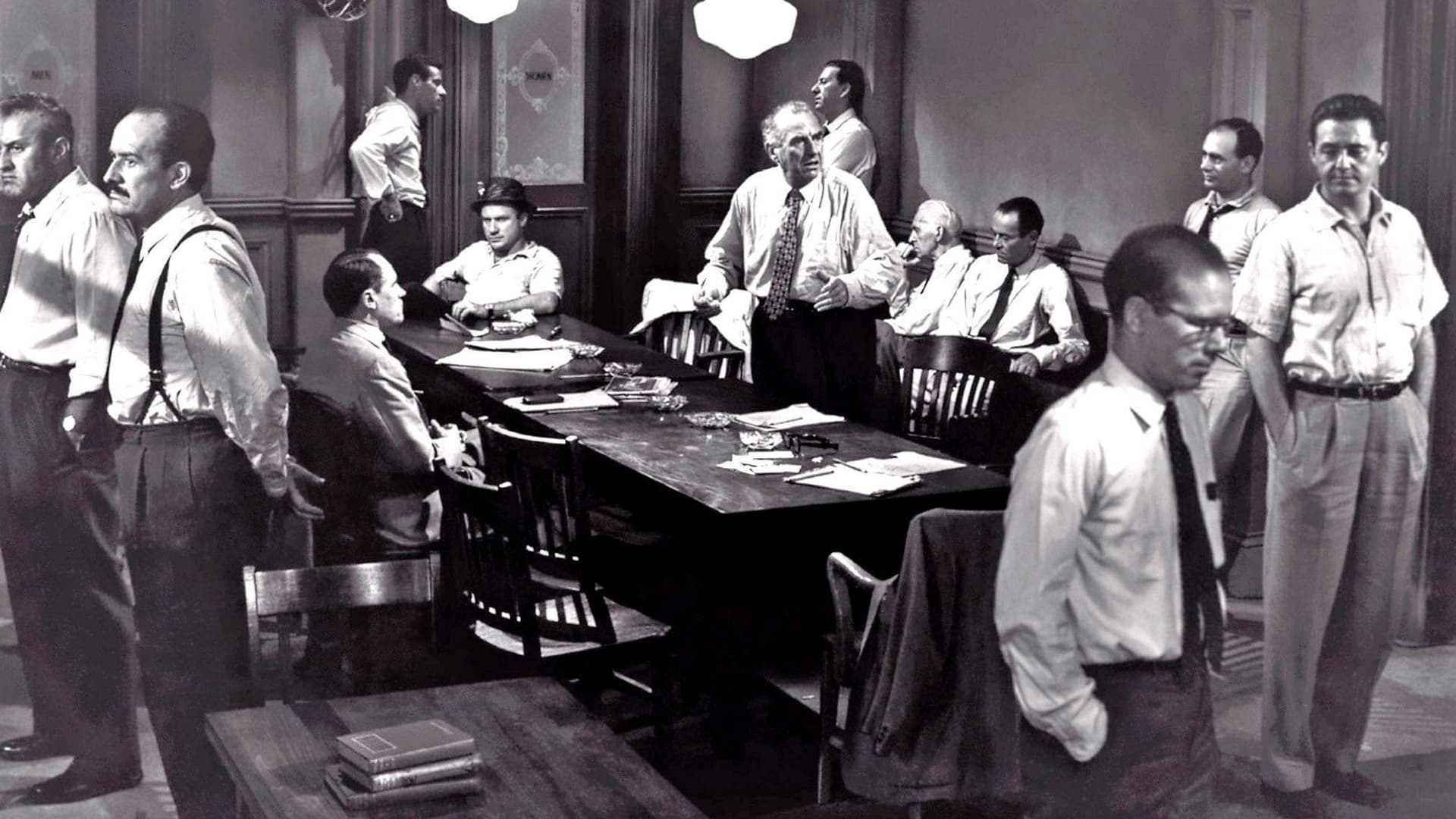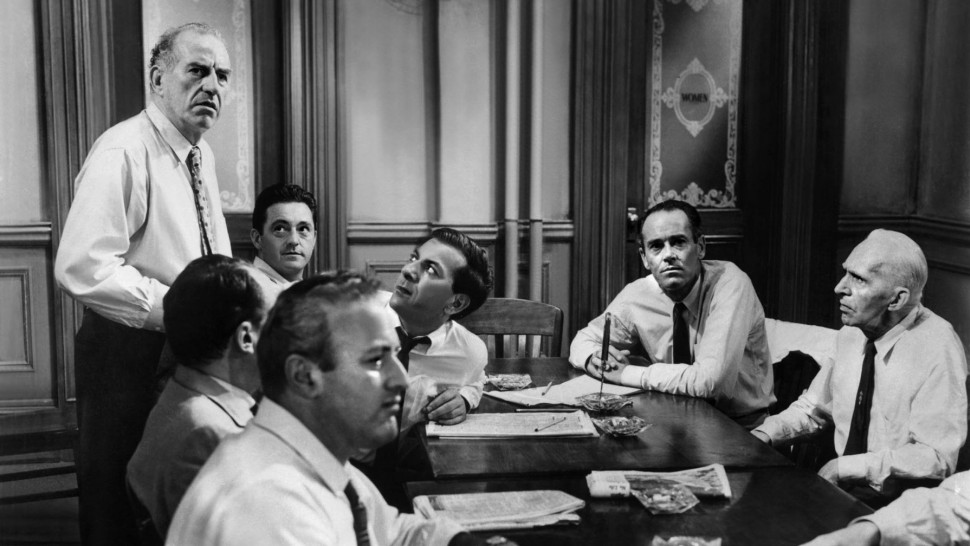12 Angry Men: A Masterpiece of Deliberation and Justice"
Introduction "12 Angry Men," directed by Sidney Lumet and released in 1957, is a timeless classic that continues to captivate audiences with its powerful storytelling, compelling performances, and thought-provoking themes. Adapted from Reginald Rose's teleplay, the film takes place almost entirely in a single room, where twelve jurors must decide the fate of a young man accused of murder. Through intense deliberation, moral introspection, and clashes of personality, the jurors confront their prejudices and biases, ultimately striving for justice. This review explores the enduring relevance and brilliance of "12 Angry Men," examining its narrative depth, character development, and social commentary.
"12 Angry Men," directed by Sidney Lumet and released in 1957, is a timeless classic that continues to captivate audiences with its powerful storytelling, compelling performances, and thought-provoking themes. Adapted from Reginald Rose's teleplay, the film takes place almost entirely in a single room, where twelve jurors must decide the fate of a young man accused of murder. Through intense deliberation, moral introspection, and clashes of personality, the jurors confront their prejudices and biases, ultimately striving for justice. This review explores the enduring relevance and brilliance of "12 Angry Men," examining its narrative depth, character development, and social commentary.
The Power of Dialogue At the heart of "12 Angry Men" lies the power of dialogue, as twelve strangers from diverse backgrounds come together to fulfill their civic duty. As the jurors grapple with the weighty responsibility of determining the defendant's guilt or innocence, their discussions evolve into a riveting exploration of human nature, morality, and the pursuit of truth. Each juror brings their own perspectives, biases, and life experiences to the table, shaping the course of deliberation and revealing the complexities of the human psyche.
At the heart of "12 Angry Men" lies the power of dialogue, as twelve strangers from diverse backgrounds come together to fulfill their civic duty. As the jurors grapple with the weighty responsibility of determining the defendant's guilt or innocence, their discussions evolve into a riveting exploration of human nature, morality, and the pursuit of truth. Each juror brings their own perspectives, biases, and life experiences to the table, shaping the course of deliberation and revealing the complexities of the human psyche.
The film masterfully utilizes dialogue to unravel the layers of the case, exposing inconsistencies in witness testimony, raising doubts about the reliability of evidence, and challenging preconceived notions of justice. Through heated exchanges, impassioned arguments, and moments of introspection, the jurors confront their prejudices and confront the flaws in their reasoning. In doing so, they demonstrate the transformative power of open-mindedness, empathy, and critical thinking in the pursuit of justice.
Character Development One of the film's greatest strengths lies in its richly drawn characters, each representing a distinct archetype and perspective. From the staunchly principled Juror 8, portrayed by Henry Fonda, to the antagonistic Juror 3, played by Lee J. Cobb, the ensemble cast delivers powerhouse performances that breathe life into their respective roles. As the deliberations unfold, the jurors undergo profound transformations, shedding their initial biases and evolving as individuals.
One of the film's greatest strengths lies in its richly drawn characters, each representing a distinct archetype and perspective. From the staunchly principled Juror 8, portrayed by Henry Fonda, to the antagonistic Juror 3, played by Lee J. Cobb, the ensemble cast delivers powerhouse performances that breathe life into their respective roles. As the deliberations unfold, the jurors undergo profound transformations, shedding their initial biases and evolving as individuals.
Juror 8 emerges as the moral compass of the group, advocating for a thorough examination of the evidence and a presumption of innocence. His unwavering commitment to justice inspires his fellow jurors to question their assumptions and reevaluate their positions. Conversely, Juror 3 embodies stubbornness and prejudice, driven by personal biases and unresolved emotional baggage. Through their interactions, the film explores themes of empathy, compassion, and the capacity for growth, reminding viewers of the importance of empathy and understanding in fostering meaningful dialogue and reconciliation.
Social Commentary "12 Angry Men" serves as a poignant commentary on the flaws and virtues of the American justice system, highlighting the inherent biases, systemic inequalities, and human fallibility that can influence legal proceedings. Set against the backdrop of a tense jury room, the film exposes the pressures, prejudices, and power dynamics that shape the deliberative process, offering a searing critique of the challenges inherent in administering justice.
"12 Angry Men" serves as a poignant commentary on the flaws and virtues of the American justice system, highlighting the inherent biases, systemic inequalities, and human fallibility that can influence legal proceedings. Set against the backdrop of a tense jury room, the film exposes the pressures, prejudices, and power dynamics that shape the deliberative process, offering a searing critique of the challenges inherent in administering justice.
The film also addresses broader social issues, including race, class, and the presumption of guilt. While the defendant's race is never explicitly mentioned, subtle cues hint at the racial tensions simmering beneath the surface, underscoring the pervasive influence of prejudice in society. Additionally, the film explores the intersection of socio-economic status and access to justice, portraying the defendant as a marginalized individual caught in the crosshairs of a flawed legal system.
"12 Angry Men" stands as a cinematic masterpiece that transcends time and genre, offering a compelling meditation on the nature of justice, the power of dialogue, and the complexities of human behavior. Through its gripping narrative, nuanced characters, and social commentary, the film invites viewers to confront their own biases, challenge assumptions, and strive for a more equitable and compassionate society.
As relevant today as it was upon its release, "12 Angry Men" continues to resonate with audiences, serving as a timeless reminder of the importance of empathy, integrity, and the pursuit of truth in the face of adversity. Whether viewed as a courtroom drama, a character study, or a social commentary, the film's enduring legacy reaffirms its status as a classic of American cinema, deserving of its place in the pantheon of great films.
Legacy and Influence Since its release in 1957, "12 Angry Men" has left an indelible mark on cinema, inspiring countless adaptations, tributes, and parodies. Its enduring popularity can be attributed to its timeless themes, universal appeal, and masterful execution. The film's minimalist setting and focus on character-driven storytelling have influenced generations of filmmakers, cementing its status as a cinematic landmark.
Since its release in 1957, "12 Angry Men" has left an indelible mark on cinema, inspiring countless adaptations, tributes, and parodies. Its enduring popularity can be attributed to its timeless themes, universal appeal, and masterful execution. The film's minimalist setting and focus on character-driven storytelling have influenced generations of filmmakers, cementing its status as a cinematic landmark.
One of the film's most enduring legacies is its exploration of the jury system and the dynamics of deliberation. "12 Angry Men" offers a rare glimpse into the inner workings of the jury room, shedding light on the deliberative process and the challenges jurors face in reaching a verdict. Its portrayal of group dynamics, persuasion techniques, and cognitive biases continues to be studied in law schools and psychology courses, providing valuable insights into human behavior and decision-making.
The film's emphasis on dialogue and moral introspection has also resonated with audiences across cultures and generations. In an age of polarized discourse and entrenched viewpoints, "12 Angry Men" serves as a timely reminder of the importance of empathy, open-mindedness, and critical thinking in resolving conflicts and bridging divides. Its message of unity and the pursuit of truth transcends the boundaries of time and space, offering hope and inspiration in an increasingly divided world.
Moreover, "12 Angry Men" has left an indelible mark on popular culture, with references and homages appearing in various media. From television shows and stage adaptations to novels and academic papers, the film's influence can be felt far and wide. Its iconic status is further solidified by its inclusion in lists of the greatest films of all time and its enduring popularity on streaming platforms and home video.
Conclusion
As we reflect on the enduring legacy of "12 Angry Men," we are reminded of the transformative power of cinema to provoke thought, evoke emotion, and inspire change. Its timeless relevance serves as a testament to the enduring power of storytelling and the universal truths that bind us together as human beings. Whether viewed as a legal drama, a character study, or a social commentary, "12 Angry Men" stands as a testament to the enduring power of cinema to illuminate the human experience and challenge our perceptions of justice, morality, and the pursuit of truth.




















































